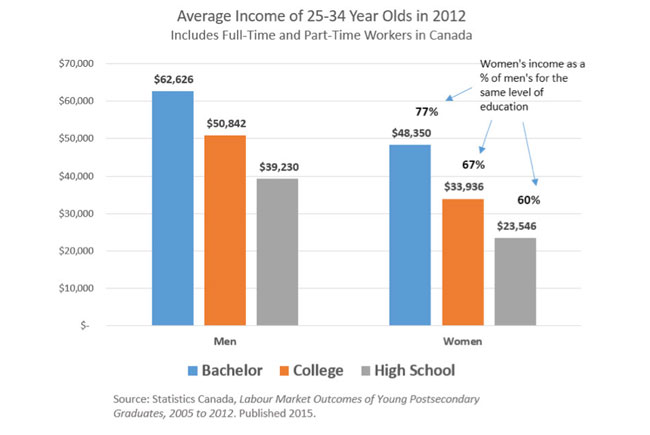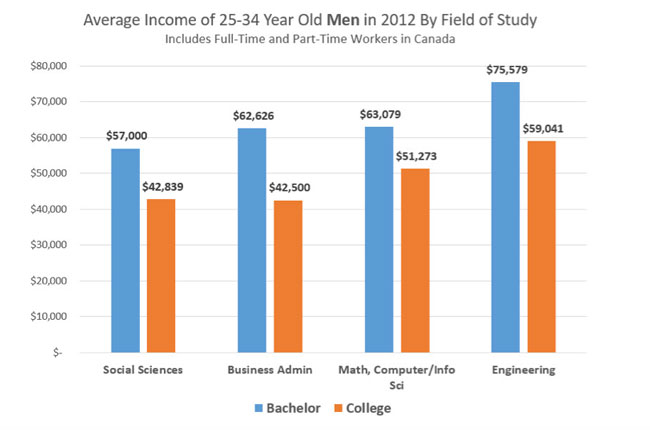Last month, I looked at the incomes of post-secondary graduates three years after graduation. Here’s another Stats Can study and another angle on incomes for post-secondary graduates, this time for Canadians aged 25 to 34 years old. (See below for the nerdy details on the study’s scope.)
The trends are much the same – university graduates make more than college grads, who in turn make more than high school graduates. A smaller wage gap exists between college and university graduates for males than for females:
- Men with a college diploma earn 81 per cent of the income of a male university grad
- Women college grads only earn 70 per cent of their university counterparts
I was, well, pretty horrified to see how much less women make than men. More educated women have a smaller wage gap, but it’s still pretty large for 2012, non?
Part of the explanation is that more women than men work part-time, so you have more part-time (read: lower) salaries dragging down the average. More college graduates work part-time than university graduates, so the same effect contributes to the lower average salaries there.
Digging down by field:
 In the fields where comparison is possible (see the nerdy details, below), university grads earn more than college graduates, consistently:
In the fields where comparison is possible (see the nerdy details, below), university grads earn more than college graduates, consistently:
- Math/computer science is the field in which male college graduates come closest to university-level incomes. The real income of college grads has risen between 2005 and 2012, narrowing the difference with bachelor’s holders (not shown in the graph, above: see the study for details.).
- Health sees the biggest gap, with female college graduates making only 60 per cent of female degree-holders.
- Humanities grads have the lowest income among bachelor’s holders. However, for women, the average income in this field is still above income of college grads in any field of study. For men, a humanities bachelor’s degree earns above the college average income but below engineering and personal/ protective services grads.
OK – that’s it for income statistics for the next few weeks, anyway… beyond that I make no promises.
The nerdy details: The main purpose of the Labour Market Outcomes study was to compare incomes of young people between 2005 and 2012, to see if the 2008 downturn had eroded earning power. (Short answer: it didn’t.) Unlike the Graduating in Canada paper, this study averages out income of both full-time and part-time workers and analyzes men and women separately. It also doesn’t include graduate degrees, or professional degrees such as medicine, veterinary medicine, law or optometry. Only the fields of study that have 200 observations or more in 2005 and 2012 are included. As a result, the fields of study included for each level of education or gender are different and comparisons can be made only across certain fields. For example, social studies is represented for both male bachelor’s and college grads and a comparison can be made. However, education is represented for female holders of bachelor’s degrees, but not college diplomas, so no comparison is possible.
Related stories
What recent graduates make – by field of study
Canada: We’re Number (Twenty-) One!
Do international students stay?
Sue Murley is Senior Director, Strategic Communications and Planning at McGill and holds a PhD in English Literature. This post reflects her personal opinions, not the official position of McGill University.




Would it be possible to get a more detailed account of the wage gap? For instance, it would be very useful to show the wage differences between women and men on the same field, with the same education level; i.e. high school educated women and men working in construction, or university educated women and men working in computer science.
Thanks!